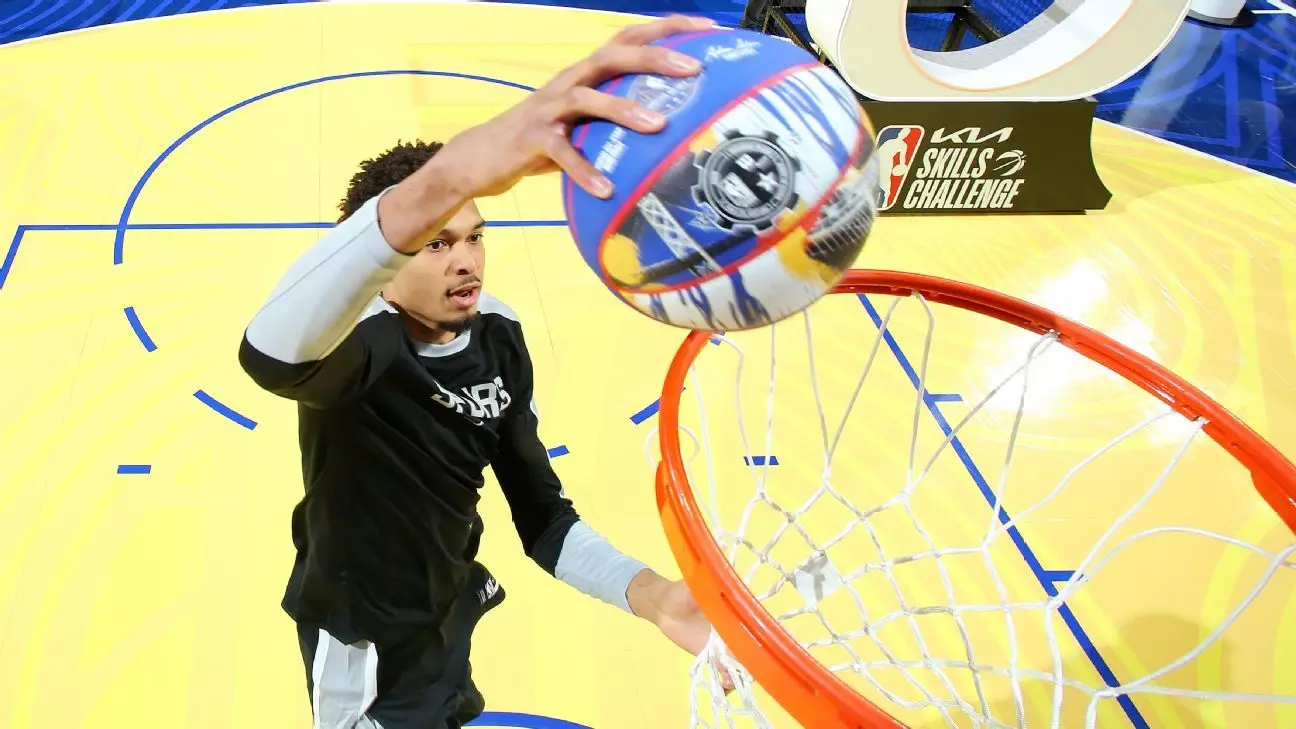The Kia Skills Challenge, a popular segment of the NBA All-Star Weekend, provided both excitement and drama this past Saturday in San Francisco, culminating in a clash between Team Cavs and Team Warriors. Ultimately, Team Cavs, featuring Donovan Mitchell and Evan Mobley, emerged victorious, clocking in at an impressive time of 1:00.03. However, the final match was overshadowed by the early disqualification of Team Spurs, comprising Chris Paul and Victor Wembanyama, after a questionable strategic decision that brought the event’s rules into sharp focus. This unique twist not only impacted the Spurs’ performance but also raised broader questions about the interpretation of competition rules in high-stakes scenarios.
The controversy began when Team Spurs attempted to bypass the traditional shooting segment of the competition—an innovative but risky strategy that ultimately backfired. In the skills challenge, teams are tasked with completing a series of shooting and passing drills. However, Paul and Wembanyama opted for an unconventional approach, focusing almost entirely on passing and deliberately avoiding legitimate shooting attempts, aside from a lone dunk by Wembanyama. They completed the first round in a brisk 47.9 seconds, only to be met with the harsh reality of disqualification when officials cited rule violations.
This incident highlights a crucial aspect of competitive sports: the balance between creativity in strategy and adherence to established rules. While the team’s intention may have been to execute a time-efficient plan, the insistence on bypassing fundamental elements of the challenge ultimately led to their undoing. Chris Paul expressed disappointment, claiming they genuinely believed their approach could yield a winning time, reflecting a common dilemma in sports where innovation occasionally clashes with convention.
The aftermath of the disqualification revealed differing perspectives within the NBA community. Draymond Green, a pivotal player for the Warriors and a keen observer of the proceedings, provided insight into Wembanyama’s process leading up to the event. Green recounted how the rookie, eager to understand the rules, sought clarity from multiple league officials concerning their strategy’s legitimacy. While this proactive questioning demonstrated a commitment to understanding the game, it may not ultimately have been enough to validate their approach.
In Wembanyama’s defense, he argued that if the rules permitted their actions, they had found a clever loophole. His hints at innovation speak to the broader narrative in sports, emphasizing how athletes often walk a fine line between bending the rules and outright breaking them—an age-old struggle that transcends basketball and pervades nearly all competitive fields. Despite the spirited attempt by Wembanyama and Paul to revolutionize the competition framework, the consensus ultimately leaned toward upholding traditional interpretations of the rules.
This incident underscores the evolving dynamics of competitive sports, where creativity and strategy are continually assessed against the backdrop of rigorous regulations. The conversations surrounding the Spurs’ disqualification may spark discussions among players, coaches, and officials regarding how rules are both interpreted and enforced. Should teams be permitted to explore unconventional tactics, or do such methods undermine the integrity of the competition?
Furthermore, this controversy brings forth the question of how players’ experiences shape their understanding and execution of game rules. For someone like Chris Paul, who has competed in six Skills Challenges without a win, the pressure of expectations and the desire to innovate can lead to challenging decisions. His longstanding presence in the competition juxtaposed with Wembanyama’s fresh perspective highlights the diverse approaches athletes bring to the table.
The Kia Skills Challenge serves as a microcosm of larger themes intrinsic to competitive sports—innovation, compliance, and the constant negotiation of rules. As the NBA continues to evolve, incidents like that of Team Spurs should serve as important lessons. While exploring creative strategies can lead to exciting new possibilities, adherence to the integrity of the game remains paramount. Moving forward, it will be essential for all participants to navigate the fine line between inventive tactics and rule compliance, ensuring that while strategies may evolve, the core principles of the game remain intact. Each competition will continue to be a test not only of skill but also of understanding the arena within which these skills are executed.


Leave a Reply